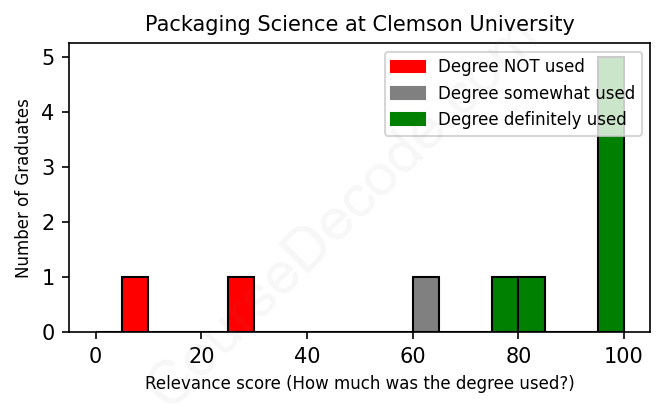
First, some facts. Of the Packaging Science graduates from Clemson University we've analyzed , here's how many have used (or NOT used) their degree in their career:

These are estimates based on AI analysis of 10 LinkedIn profiles (see below).
The verdict? Above average. Overall, with an average relevance score of 76%, Packaging Science graduates from Clemson University have a higher likelihood (+9%) of finding work in this field compared to the average graduate across all fields:
And for comparison, here's the chart for all profiles we've looked at across all degrees.
Also, after graduating, 40% of these graduates have pursued further education other than another Bachelor's degree (such as a Masters degree or other), compared to the average across all profiles of 35%. This suggests you may need more than just a Bachelors degree to be competitive as a Packaging Science graduate.
See the details:
|
Relevance score: 100% We think this person has gone into a career highly relevant to their degree. We think this person has gone into a career highly relevant to their degree.
DEGREE INFOGraduated in 2013 from Clemson University with a Bachelor's Degree in Packaging Science. No other secondary education since. JOB HISTORY SINCE GRADUATIONPackaging Co-Op McCormick & Company Jan 2013 - Aug 2013 Packaging Analyst  IPS Packaging Jul 2015 - Sep 2016 Packaging Engineer  Sterling Contract Packaging, Inc. Apr 2021 - Present ABOUTNo information provided. |
The top 10 most common jobs done by the graduates we've analyzed (ranked most common to least) are:
From my analysis of LinkedIn profiles of graduates from Clemson University with a degree in Packaging Science, a clear trend emerges in the types of jobs they've taken on. Many individuals have found roles such as Packaging Engineers, Packaging Specialists, or positions related to packaging design and development. These jobs typically leverage the technical skills gained during their studies, indicating a strong connection between their degree and career paths. For instance, roles like Packaging Engineer II at Raytheon or Senior Package and Prototype Designer at Sealed Air Corporation showcase their ability to apply packaging principles directly in their work.
However, not every job seems to stick closely to the Packaging Science curriculum. A number of graduates have ventured into roles that seem quite distant from their field of study, like medical-related positions or general project management roles. While they may utilize some soft skills or broad analytical thinking, these positions often lack the technical application of packaging science knowledge. Thus, while many graduates are successfully finding very relevant roles tied to their degree, others are on paths that don’t fully utilize their specialized training in packaging science. It’s a mix of both worlds, really—some are right where their education fits in perfectly, but others have diverged towards different fields entirely.
Here is a visual representation of the most common words in job titles for Packaging Science graduates (this is across all Packaging Science graduates we've analyzed, not just those who went to Clemson University):

Graduates with a degree in Packaging Science from Clemson University tend to follow a pretty clear career path in the packaging industry. For many, the first job after graduation is often a packaging engineer or something closely related, typically involving internships or co-op positions that provide the practical experience necessary to get started. Taking a look at the profiles, it's common to see early roles like Packaging Engineer Co-Op, Packaging Specialist, or similar positions, where they gain hands-on experience. Over the first few years, they usually progress into more specialized roles, sometimes shifting into areas like risk management or product design for different industries, including automotive and consumer goods.
As time goes on, specifically around the 5 to 10-year mark, many graduates stay within the packaging realm but often take on more senior or leadership roles. Positions like Senior Packaging Engineer, Director of Logistics Strategy, or even consultants at major firms like Bain & Company show that there's significant upward mobility. While some people might pivot into unrelated fields—like the medical route seen in one profile—the majority tend to find stable careers within industries that value their packaging expertise. Overall, it seems like a solid path with plenty of opportunities for career growth, especially for those committed to the packaging science field.
So, when it comes to a Bachelor’s degree in Packaging Science at Clemson, it can be a bit challenging, but it’s not impossible! In general, this degree blends elements of engineering, materials science, and design, so you’ll be dealing with some technical stuff, like understanding materials and creating innovative packaging solutions. It’s definitely harder than many traditional liberal arts degrees, but it’s not as tough as some hardcore engineering programs. If you enjoy hands-on projects and have a knack for problem-solving, you might find it pretty manageable. Just be ready to dive into lab work and collaborate with classmates, since teamwork often plays a big role in this field!
Most commonly, in the LinkedIn profiles we've looked at, it takes people 4 years to finish a Bachelor degree in Packaging Science.
So, looking at these Clemson graduates in Packaging Science, it seems like they’ve landed some pretty good gigs over the years, especially if we’re talking about money. The paths they’ve taken vary a lot, but many of them have transitioned into roles with increasing responsibility and higher pay, like working as senior engineers or consultants at big companies like Amazon and Dow. The ones who went into healthcare as residents and fellows probably have a debt to repay, but they'll likely earn a decent living once they're fully practicing. Overall, it looks like a lot of these folks are making solid money in their respective fields, especially compared to your average entry-level job. So yeah, if you’re considering packaging science, it seems like a pretty promising route for stacking up some cash!
Here is a visual representation of the most common words seen in the "about" section of LinkedIn profiles who have a Bachelor degree in Packaging Science (this is across all Packaging Science graduates we've analyzed, not just those who went to Clemson University). This may or may not be useful:

Here are all colleges offering a Bachelor degree in Packaging Science (ordered by the average relevance score of their Packaging Science graduates, best to worst) where we have analyzed at least 10 of their graduates:
| College | Score | Count |
|---|---|---|
 Michigan State University Michigan State University
|
84 | 15 |
 Clemson University Clemson University
|
76 | 10 |